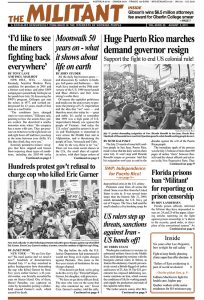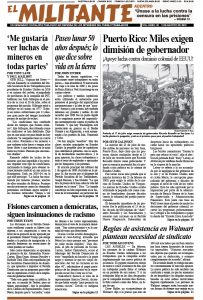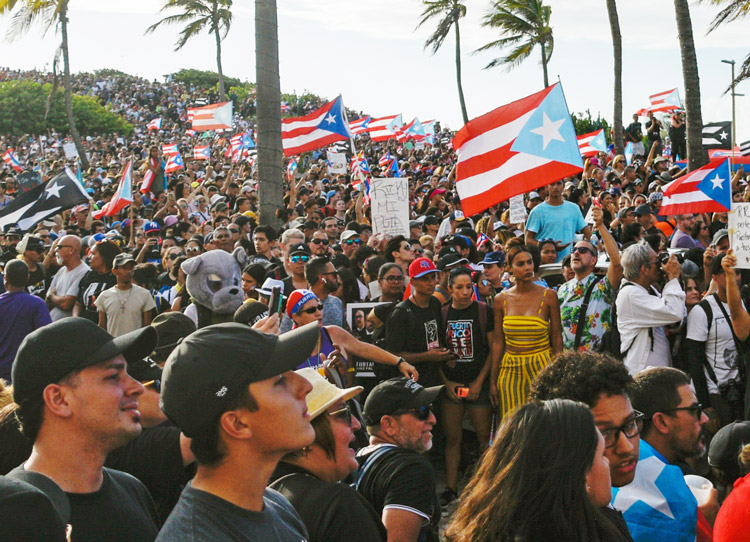The July 23 march of some half a million people in San Juan, Puerto Rico, made it clear that the daily actions there since July 13 won’t stop until Ricardo Rosselló resigns as governor. And that his resignation won’t put an end to the deep political crisis in the U.S. colony.
Protesters came from all across the island. Some even flew from the United States to join in. It was several times larger than the historic Feb. 21, 2000, march demanding the U.S. Navy get out of Vieques. The Navy had used the small island as a live bombing range for decades against the will of the Puerto Rican people.
The immediate spark of the protests was the July 13 release of more than 800 pages of online “chats” between Rosselló and his closest officials and advisers in the New Progressive Party. They oozed with contempt for working people as well as his bourgeois political opponents.
The crass comments “were the drop of water that overflowed the cup,” retired electrician Raúl “Ruly” Laboy, told the Militant by phone from Humacao on the eve of the march. Humacao was one of the areas hardest hit by Hurricane Maria.
‘Take the board with you’
Laboy was referring to the pent-up anger over the negligence of the Puerto Rican and U.S. governments in the face of Maria; widespread government corruption; and decades of attacks on the standard of living of working people. And anger over the imposition by the Barack Obama administration of the Financial Oversight and Management Board for Puerto Rico. The Wall Street-based board has the power to override decisions of the colonial regime, slash government programs and force working people to pay for the “Commonwealth’s” $74 billion debt to bondholders.
One popular chant at the actions was “Ricky, resign, and take the board with you.”
On July 10 the FBI arrested six people on charges of corruption, including former Education Secretary Julia Keleher and Ángela Ávila Marrero, former executive director of the Puerto Rico Health Insurance Administration. The two were accused of steering $15.5 million in federal contracts to their friends.
“The government closed four out of five schools here since the hurricane,” Laboy said. “Many roads are still closed. Others have only been reopened by the actions of working people ourselves.”
In the chats released by the Center for Investigative Reporting, Rosselló and his cohorts call New York City Puerto Rican politician Melissa Mark-Viverito a “whore” and complain that San Juan Mayor Carmen Yulín Cruz, from the Popular Democratic Party, the main bourgeois opposition, is either “off her meds” or a “son-of-a-bitch.” They insult rivals in their own party. They discuss how to throw government contracts to their cronies and joke about those who died from the hurricane.
Handmade signs dotted the march. Many simply said, “4,645,” one estimate of the number who died from the effects of Maria, or the name of a loved one who died. For nearly a year, Rosselló’s colonial government claimed only 64 people died from the storm. Finally, after he could deny the truth no more, he admitted at least 3,000 had perished.
Most deaths were not from the storm itself, but from the social catastrophe in its wake — due to government inaction both in Puerto Rico and in Washington and the dog-eat-dog workings of capitalism.
Storm shelters didn’t have enough food or water. Hospitals and health clinics shut down or couldn’t provide adequate care because power went out. Electricity wasn’t restored in large parts of the island for a year. The one hospital on Vieques still isn’t open.
Reconstruction aid has been dispensed with an eyedropper and the Federal Emergency Management Agency denied aid to thousands because they had never been able to get a title to their homes.
Adding insult to injury was the widespread corruption, while the government and the fiscal board keep cutting pensions and health care and closing schools.
‘Completely indignant’
“We’re completely indignant,” Rufino Carrión, a pastor who organized protests against the slow pace of power restoration last year, said by phone from Gurabo. “It is always the most vulnerable, the poor who pay for the broken plates. Nearly two years after the storm there are still 15,000 homes with only a blue tarp as a roof — and these corrupt politicians of both parties are stealing millions and millions of dollars.”
Leaders of Rosselló’s party have joined the clamor demanding his resignation, including former Gov. Luis Fortuño; nonvoting representative to Congress Jenniffer González; and the mayor of Bayamón. Many of Rosselló’s aides have quit.
According to the island’s colonial constitution, if Rosselló resigns, the next in line is the secretary of state. But that post went vacant after Luis Rivera Marín resigned due to his participation in the chat scandal. Next in line is the secretary of justice.
Worried that they can’t put in place new faces that will carry out the needs of the U.S. rulers, the Washington Post demanded in a July 19 editorial that “Congress should take steps to strengthen the [fiscal] board” and impose more “rigorous oversight,” over Puerto Rico.
“Both parties are the same,” Laboy said. “But the left is not strong enough to govern.”
He hits at a real problem. Struggle by working people here has yet to develop a working-class leadership capable of taking political power, like Fidel Castro and the July 26 Movement did in Cuba. When Rosselló goes, he’ll be replaced with another crooked stooge of Uncle Sam.
Laboy’s sister, Mildred, a leader of the community group Arecma, told the Militant, “If Rosselló resigns and things continue to be the same, then the people will have learned something.”


